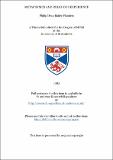Files in this item
Metaphysics and religious experience
Item metadata
| dc.contributor.advisor | Smith, Richard N.W | |
| dc.contributor.author | Flanders, Philip Dean Bailey | |
| dc.coverage.spatial | 370 p. | en_US |
| dc.date.accessioned | 2018-05-22T15:33:52Z | |
| dc.date.available | 2018-05-22T15:33:52Z | |
| dc.date.issued | 1982-06 | |
| dc.identifier.uri | https://hdl.handle.net/10023/13470 | |
| dc.description.abstract | The thesis is entitled Metaphysics and Religious Experience and is concerned, in the main, to explore the degree to which metaphysical argument can, if at all, corroborate the professed insights of those who claim, or have claimed, to have personally encountered God, or a Divine Being. The thesis is divided into an introductory chapter and nine subsequent chapters. The introductory chapter is entitled "Does Religious Language convey an Intelligible Message?" and is concerned to clear the ground for talking about religion, by rebutting verificationist-inspired claims that religious language is not, and cannot be, cognitively meaningful. In Chapter One, which is entitled "Religious Experience and Knowledge of God" the question of whether it is legitimate to make truth-claims on the basis of ostensible religious experience is examined, and it is concluded that critics of religious experience such as Hepburn and Martin ultimately fail to prove their case. Chapter Two moves away from the critique of verificationism with which the first two chapters (including the introductory chapter) are concerned, to a consideration of whether the various subjects of supposed religious experience have in all ages and cultures been led through their experiences to make similar claims. Chapter Three is entitled "The Possibility of Metaphysics" and sets out to examine the major criticisms of the enterprise of metaphysical argument. Chapter Four is entitled "The Nature of Finite Individuals" and is concerned to argue for a metaphysical proposition, which, on the basis of more immediate intuitive experience, the mystics (and other subjects of ostensible religious experience) would also uphold. Chapter Five is entitled "Bosanquet's Refutation of Pluralism" and Chapter Six is entitled "The Position of J.N. Findlay on the Nature of Finite Individuals." The chapters primarily deal with the philosophers' respective arguments for the truth of the metaphysical proposition mentioned above. Chapter Seven is entitled "Man, Nature and the Primacy of the Subject" and is concerned to appraise arguments for and ultimately to defend the view that a further metaphysical proposition, supportive of the mystics' (& etc.) claims, may plausibly be affirmed, that proposition being that in addition to there being an ultimate confluence of finite minds, there is also an ultimate unity between mind and nature. Chapter Eight is entitled "The Testimony of Religion as it is Practised" and deals with the question of whether the ritualistic religious consciousness of' the ordinary religious believer contains any element of genuine insight. Chapter Nine, the final chapter, is entitled "Moral Experience as Evidence for the Mystical Absolute." This chapter is concerned to argue that deep philosophical reflection on the nature of our moral experience provides us with strong evidence that finite individuals have an acute, consciousness of a universal spiritual "state of being", transcending their natures as particulars. This "state of being" corresponds closely to the "Divine Being" or "Spiritual Presence" which mystics (& etc.) claim to have encountered, and thus moral experience provides further support for their claims. The Spiritual Reality revealed through metaphysical reflection transcends finite beings, but is immanent to them nonetheless. It constitutes a Reality which shows up the tragic limitation of finite life. Yet it also shows that the potential, value, and destiny of all finite life is to express an essence which goes far beyond the finite. | en_US |
| dc.language.iso | en | en_US |
| dc.publisher | University of St Andrews | |
| dc.subject.lcc | BL65.M48F6 | en |
| dc.subject.lcsh | Philosophy and religion | en |
| dc.title | Metaphysics and religious experience | en_US |
| dc.type | Thesis | en_US |
| dc.type.qualificationlevel | Masters | en_US |
| dc.type.qualificationname | MPhil Master of Philosophy | en_US |
| dc.publisher.institution | The University of St Andrews | en_US |
This item appears in the following Collection(s)
Items in the St Andrews Research Repository are protected by copyright, with all rights reserved, unless otherwise indicated.

